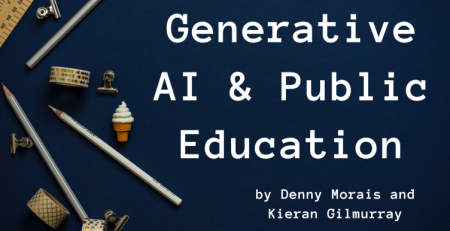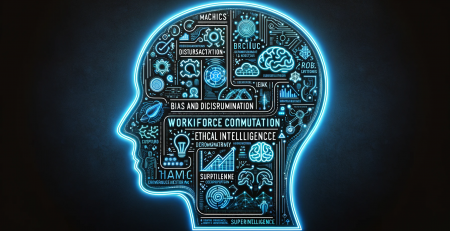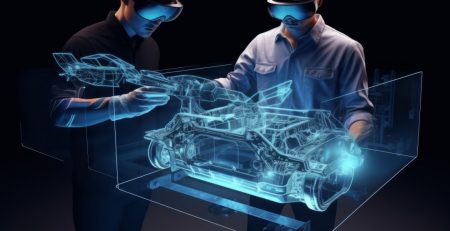The Practical AI Applications in Everyday Life
What if AI wasn’t just about self-driving cars and robot assistants? What if it silently made your everyday life smoother? Imagine waking up to a world where AI has already taken care of your morning routine, from brewing your coffee to adjusting the temperature in your home to answering all your emails. The truth is, Artificial Intelligence (AI) is already impacting us in profound ways, often behind the scenes. While discussions about AI usually focuses on theoretical future applications, a wealth of practical solutions are already enhancing our daily lives. Let’s delve into the world of “practical AI” – AI solutions that directly address real-world problems and quietly improve our lives.
The Untapped Potential of Practical AI
By “practical AI,” we mean solutions that directly address real-world problems and enhance our daily lives. These are the AI applications that are already in use, making our lives easier and more efficient. This stands in contrast to the often-hyped, futuristic applications that may be years or even decades away. The beauty of practical AI is that it’s here, right now. It’s already woven into the fabric of our daily routines, silently making things more efficient, sustainable, and sometimes even a little bit more fun.
Real-World Examples: AI in Action
Here are just a few examples of how AI is quietly improving our lives:
Protecting Our Infrastructure: Predicting Power Outages
Imagine a world with fewer frustrating power cuts. AI, specifically machine learning algorithms, is playing a crucial role in preventing power outages. By analysing vast amounts of data, including grid load and weather patterns, these algorithms can predict potential stress points in the power grid and take preventive measures. This not only reduces disruptions for homes and businesses but also saves money and improves overall well-being in communities.
Safeguarding Our Oceans: Combating Illegal Fishing
The vastness of our oceans makes it difficult to police illegal fishing practices. However, AI is stepping up to the challenge by analysing satellite imagery to detect suspicious activity by illegal fishing vessels. By monitoring factors like location and unusual behaviour patterns, AI helps authorities apprehend violators. This not only protects fish stocks but also ensures sustainable fishing practices, which are critical for the health of our oceans and planet.
Protecting Our Waterways: AI and Water Quality
Clean water is essential for life. A water company is using AI to improve river quality. Here’s how it works: AI analyses data from water sensors, historical pollution records, and even weather patterns. This allows for the prediction and prevention of pollution, thereby safeguarding public health and aquatic ecosystems.
The Future of Farming: Driverless Tractors
Farming is a back-breaking profession, but AI is lending a helping hand to farmers using AI-powered driverless tractors. These automated machines navigate fields precisely, optimising tasks and reducing reliance on manual labour. The potential benefits are significant: increased efficiency, improved crop yields, and freeing up farmers’ time for other crucial aspects of their operations.
- Driverless tractors ‘the future’ says St Neots farmer (bbc.com)
- US farms are making an urgent push into AI. It could help feed the world (bbc.com)
AI Sommelier: Tailoring Wine to New Preferences
The world of wine is complex, and consumer tastes evolve. BBC News explores the application of AI in crafting wines that appeal to younger consumers. By analysing vast sets of data on consumer preferences, grape varietals, weather conditions, and historical vintages, AI can predict trends and optimise winemaking processes. This could lead to exciting developments, such as wines tailored to specific preferences, personalized recommendations, and potentially more efficient and sustainable wine production.
Augmenting Human Ability: Keeping People Working Longer
Physical jobs can take a toll on the body. However, now AI-powered exoskeletons and collaborative robots are offering support to human workers. These intelligent systems provide physical assistance, reducing strain and extending people’s ability to perform demanding tasks well into their later years. The potential benefits are multifaceted:
- Improved worker safety and well-being
- Increased productivity
- Potentially creating new opportunities for older workers in the workforce
- ‘AI can help people keep physical jobs for longer’ (bbc.com)
The Curious Case of AI: Benefits and Considerations
These practical AI applications offer a multitude of benefits, including:
- Improved Efficiency: AI automates tasks, optimises processes, and reduces human error, leading to significant efficiency gains across various industries.
- Sustainability: AI can help us predict and prevent environmental issues, optimise resource usage, and promote sustainable practices.
- Personalised Experiences: AI tailors experiences to individual needs and preferences, from product recommendations to content curation.
- Cost Savings: By automating tasks, reducing errors, and optimising processes, AI can lead to significant cost savings for businesses and consumers. For businesses, this means increased profitability and competitiveness. For consumers, this could translate to lower prices and improved product quality. However, as with any powerful technology, the responsible development and deployment of AI are crucial. We must consider the ethical implications and potential biases in AI algorithms to ensure fairness and inclusivity.
Additionally, AI is not a perfect solution. It has its limitations and can sometimes make mistakes. It’s important to be aware of these challenges and work towards improving AI technology. However, as with any powerful technology, the responsible development and deployment of AI are crucial. We must consider the ethical implications and potential biases in AI algorithms to ensure fairness and inclusivity.
The Future We Can See
The continued development and integration of AI into our daily lives holds immense potential, sparking excitement about the future possibilities.
- Smarter Cities: Imagine traffic lights that adjust to real-time congestion or waste management systems optimised for efficiency. AI can revolutionise how our cities function.
- Personalised Healthcare: AI could analyse medical data to predict and prevent illnesses, leading to more personalised and proactive healthcare.
- Enhanced Education: AI-powered tutors could personalise learning experiences, catering to individual needs and learning styles.
- BBC Arts – Hay Festival, 2018 – Seven ways artificial intelligence can make the world better
The Takeaway
The future of AI is not just about science fiction; it’s about shaping a better present. As AI continues to evolve, let’s ensure that this technology serves humanity for the greater good. So, the next time you use a map app that avoids traffic jams or enjoy a glass of perfectly tailored wine, remember: AI might be playing a role behind the scenes, making your day a little bit better.
The question remains: Are you ready to explore how AI can revolutionise your world? If so, start by learning more about the practical applications of AI in your field of interest. You might be surprised by how AI is already shaping your world.
Image Source:
Check Out My Previous Blog Here: Future of Business Decisions with Generative BI (kierangilmurray.com)









Leave a Reply